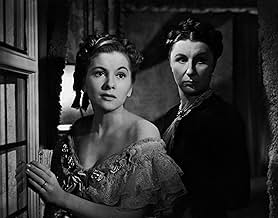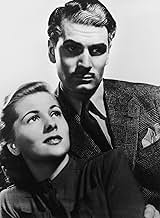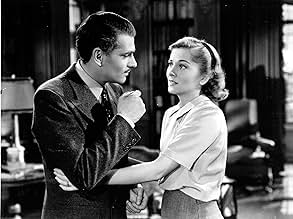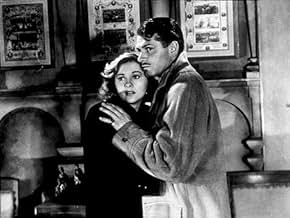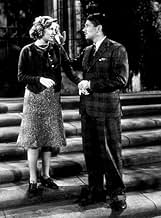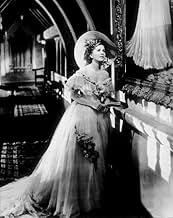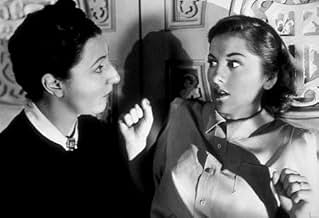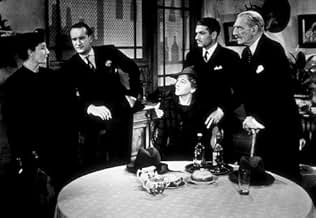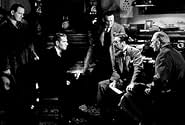Rebecca
- 1940
- Tous publics
- 2h 10m
A self-conscious woman juggles adjusting to her new role as an aristocrat's wife and avoiding being intimidated by his first wife's spectral presence.A self-conscious woman juggles adjusting to her new role as an aristocrat's wife and avoiding being intimidated by his first wife's spectral presence.A self-conscious woman juggles adjusting to her new role as an aristocrat's wife and avoiding being intimidated by his first wife's spectral presence.
- Won 2 Oscars
- 10 wins & 10 nominations total
Bunny Beatty
- Maid
- (uncredited)
Billy Bevan
- Policeman
- (uncredited)
Summary
Reviewers say 'Rebecca' is acclaimed for its atmospheric storytelling and psychological tension, showcasing Alfred Hitchcock's masterful direction. The film's haunting ambiance, complex characters, and enigmatic Rebecca are highlighted. Key themes include identity, memory, and the struggle of the second Mrs. de Winter. Performances by Joan Fontaine, Laurence Olivier, and Judith Anderson are praised. Cinematography and set design enhance the gothic suspense. Some find the plot uneven and the ending less satisfying, but it remains a significant work in Hitchcock's career.
Featured reviews
"Rebecca" was the first Hitchcock film I ever saw, and I was mesmerized by it from the start, convinced that I had to see more of the director's work. It richly deserved the Oscar it received, but it's a real puzzle that the Academy saw fit to withhold a best director award for Hitch. Would one possibly give an award to a work by Picasso and not to Picasso himself?
"Rebecca" was the first of the director's American-made films, and it shows. It's quite different from his earlier British-made films, such as "Young and Innocent" and even "The Lady Vanishes," which somehow seem more amateurish by comparison. (I know little of the British cinema of that era, but it's difficult not to conclude that Hollywood was better at producing more sophisticated efforts.) I would even judge "Rebecca" the best of his films of the early 1940s, with the possible exception of "Shadow of a Doubt." It is true, of course, that much of this film has become cliché (remember the spoofs on the old "Carol Burnette Show"!), but it still weathers the decades very well. The acting is uniformly excellent. Olivier is the hardened Maxim de Winter, untitled lord of Manderly, trying to forget the past and given to unexpected bouts of anger and coldheartedness. Fontaine is perfect as the unnamed mousy heroine, innocent yet deeply in love, still carrying with her the aura of an awkward schoolgirl. Even character actor Nigel Bruce, best known for his role in the Sherlock Holmes films, makes an appearance and plays, in effect, Nigel Bruce!
But it is Judith Anderson's role as Mrs. Danvers that viewers are likely to remember best. Her presence is as dark and foreboding as that of the deceased Rebecca herself, and Fontaine is evidently cowed by her icy stare and unnervingly formal manner. The dynamics between the two actresses are wonderful. Who could fail to empathize with Fontaine's unenviable position as, in effect, the new employer of such an intimidating personage? On the other hand, Olivier seems quite unfearful of Anderson, despite her representing so much of the past he is trying to block out. This part of the plot (even in the book) never made much sense to me and is unconvincing.
As far as I know, this film marked Hitch's first collaboration with composer Franz Waxman, whose haunting score makes it all the more memorable. Waxman's scores are perhaps less obviously cinematic than those of the incomparable Bernard Herrmann, who would score Hitch's films from 1955 to 1966. Contrast the score for "Rebecca" to Herrmann's music for "Citizen Kane" the following year, and you'll immediately hear the difference. Waxman's is more symphonic in the central European style reflective of his own birth and upbringing. Yet it is worth recalling that scoring films was still a new art at this time, and both Waxman and Herrmann were pioneers.
Finally, one has to mention the cinematography, which is magnificent. Technically "Rebecca" might have been filmed in colour, which was newly available in 1940. ("Gone with the Wind" was filmed entirely in colour the previous year, while "The Wizzard of Oz" and "The Women" had colour scenes.) But colour would have diminished its impact. The suspense and the ominous sense of impending doom could only have been communicated through the medium of black-and-white and the deft use of light and shade which it affords.
In one respect, of course, "Rebecca" is not a typical Hitchcock film. There is no fleeing innocent trying to clear his name of a crime he did not commit. Surprisingly, there isn't even a murder, although its absence was apparently imposed by the Hayes Code and is certainly foreign to Daphne du Maurier's original novel. Some have said that there is more Selznick than Hitchcock in this film, and perhaps there's something to that. Still, if the collaborative effort between the two was not exactly amiable, it was nevertheless successful.
In short, this is the first in a string of Hitchcock masterpieces.
"Rebecca" was the first of the director's American-made films, and it shows. It's quite different from his earlier British-made films, such as "Young and Innocent" and even "The Lady Vanishes," which somehow seem more amateurish by comparison. (I know little of the British cinema of that era, but it's difficult not to conclude that Hollywood was better at producing more sophisticated efforts.) I would even judge "Rebecca" the best of his films of the early 1940s, with the possible exception of "Shadow of a Doubt." It is true, of course, that much of this film has become cliché (remember the spoofs on the old "Carol Burnette Show"!), but it still weathers the decades very well. The acting is uniformly excellent. Olivier is the hardened Maxim de Winter, untitled lord of Manderly, trying to forget the past and given to unexpected bouts of anger and coldheartedness. Fontaine is perfect as the unnamed mousy heroine, innocent yet deeply in love, still carrying with her the aura of an awkward schoolgirl. Even character actor Nigel Bruce, best known for his role in the Sherlock Holmes films, makes an appearance and plays, in effect, Nigel Bruce!
But it is Judith Anderson's role as Mrs. Danvers that viewers are likely to remember best. Her presence is as dark and foreboding as that of the deceased Rebecca herself, and Fontaine is evidently cowed by her icy stare and unnervingly formal manner. The dynamics between the two actresses are wonderful. Who could fail to empathize with Fontaine's unenviable position as, in effect, the new employer of such an intimidating personage? On the other hand, Olivier seems quite unfearful of Anderson, despite her representing so much of the past he is trying to block out. This part of the plot (even in the book) never made much sense to me and is unconvincing.
As far as I know, this film marked Hitch's first collaboration with composer Franz Waxman, whose haunting score makes it all the more memorable. Waxman's scores are perhaps less obviously cinematic than those of the incomparable Bernard Herrmann, who would score Hitch's films from 1955 to 1966. Contrast the score for "Rebecca" to Herrmann's music for "Citizen Kane" the following year, and you'll immediately hear the difference. Waxman's is more symphonic in the central European style reflective of his own birth and upbringing. Yet it is worth recalling that scoring films was still a new art at this time, and both Waxman and Herrmann were pioneers.
Finally, one has to mention the cinematography, which is magnificent. Technically "Rebecca" might have been filmed in colour, which was newly available in 1940. ("Gone with the Wind" was filmed entirely in colour the previous year, while "The Wizzard of Oz" and "The Women" had colour scenes.) But colour would have diminished its impact. The suspense and the ominous sense of impending doom could only have been communicated through the medium of black-and-white and the deft use of light and shade which it affords.
In one respect, of course, "Rebecca" is not a typical Hitchcock film. There is no fleeing innocent trying to clear his name of a crime he did not commit. Surprisingly, there isn't even a murder, although its absence was apparently imposed by the Hayes Code and is certainly foreign to Daphne du Maurier's original novel. Some have said that there is more Selznick than Hitchcock in this film, and perhaps there's something to that. Still, if the collaborative effort between the two was not exactly amiable, it was nevertheless successful.
In short, this is the first in a string of Hitchcock masterpieces.
This is a Daphne Du Maurier's story (from a best-seller novel) concerning a prominent widower (Laurence Olivier) called Maxim De Winter who finds a gorgeous and timid young girl (Joan Fontaine) who is serving to an old Mistress (Florence Bates) . They are married and head to Manderley , the familiar mansion (in the exterior actually is a scale model). But Maxim is haunted by the ghost first wife , an enigmatic Rebecca , who died in mysterious circumstances . There works as a servant the creepy and obsessive housekeeper , Mrs Danvers (Judith Anderson,a famous stage actress in her most important role) and sh meets a cynic gentleman (George Sanders).
This film has suspense , romance , unlimited tension , full of lingering images and with the typical touches Hitchcock . Besides , a literately and thoughtful dialog signed by Joan Harrison (Hitchcock's usual screenwriter) though lacking humor . After ¨39 steps¨and ¨Jamaica Inn¨ , Hitch was encouraged to go to America and promptly shot his first work in Hollywood hired by the great producer David O'Selznick . Fine performance by Laurence Olivier , he married Vivien Leigh and he wished to her as protagonist but Hitch hired Joan Fontaine who took seven rehearsal sessions until the engaging . Joan Fontaine as a shy bride young is superb and enjoyable . Judith Anderson as a spooky and cold house keeper is top-notch, her role as obsessed person by the glamorous Rebecca is unforgotten and immortal . Atmospheric and perceptible music by Franz Waxman and sensational visual style by the cameraman George Barnes . The picture won Academy Awards for Best film and cinematography . The movie was brilliantly directed by the Master of Suspense . It's remade in inferior versions for Television, the 1980 adaptation with Jeremy Brett as Maxim and 1996 rendition with Charles Dance and Emilie Fox . The motion picture is indispensable watching for Hithcock lovers achieving the maximum impact on his audience.
This film has suspense , romance , unlimited tension , full of lingering images and with the typical touches Hitchcock . Besides , a literately and thoughtful dialog signed by Joan Harrison (Hitchcock's usual screenwriter) though lacking humor . After ¨39 steps¨and ¨Jamaica Inn¨ , Hitch was encouraged to go to America and promptly shot his first work in Hollywood hired by the great producer David O'Selznick . Fine performance by Laurence Olivier , he married Vivien Leigh and he wished to her as protagonist but Hitch hired Joan Fontaine who took seven rehearsal sessions until the engaging . Joan Fontaine as a shy bride young is superb and enjoyable . Judith Anderson as a spooky and cold house keeper is top-notch, her role as obsessed person by the glamorous Rebecca is unforgotten and immortal . Atmospheric and perceptible music by Franz Waxman and sensational visual style by the cameraman George Barnes . The picture won Academy Awards for Best film and cinematography . The movie was brilliantly directed by the Master of Suspense . It's remade in inferior versions for Television, the 1980 adaptation with Jeremy Brett as Maxim and 1996 rendition with Charles Dance and Emilie Fox . The motion picture is indispensable watching for Hithcock lovers achieving the maximum impact on his audience.
Hitchcock felt 'Rebecca', his first Hollywood film, was a compromise, but as a viewer I just can't fault it. It's a masterpiece in my opinion, full of suspense, mystery and brooding atmosphere. It's also one of the most romantic movies I've ever seen. I've watched it several times over the years, and even now that I know all the plot twists and turns (quite shocking on your first viewing), it never fails to hook me in. One of the reasons it really works is the flawless casting. I'm not much of an Olivier fan but he's superb as de Winter, with just the right mixture of charm and coldness. And Joan Fontaine is just perfect as de Winter's new bride. I can't spot an unconvincing moment in her performance and can't imagine any other actress in the role. Hitchcock subsequently used her in 'Suspicion' with Cary Grant. She was also excellent in that but 'Rebecca' is a much stronger movie. The supporting cast also includes some brilliant performances, especially Judith Anderson ('Laura') as the extremely creepy Mrs. Danvers, George Sanders who plays Rebecca's slimy cousin, and Nigel Bruce in a typical role as de Winter's bumbling brother-in-law Major Lacy. Sanders subsequently worked again with Hitchcock in 'Foreign Correspondent', and Bruce played Cary Grant's lovable pal "Beaky" in 'Suspicion'. I sometimes think that Hitchcock's 1940s movies are overlooked by many because they are regarded as being too "old fashioned", but for me movies like 'Suspicion', 'Saboteur', 'Lifeboat' and 'Spellbound' are some of the most entertaining movies Hitchcock ever made, and 'Rebecca' is the best of the lot. If you want to be totally enthralled for two hours just watch 'Rebecca'!
This was Alfred Hitchcock's first American-made film. Quite frankly, I'm amazed at how well Hitchcock "got" what American audiences wanted in their suspense films, hitting them out of the park from the moment he began working in the US.
Apart from being a tad bit long, this is a well made film. I love the inside of Mandalay and Sir Laurence Olivier played a wonderful mysterious and sullen Maximillian De Winter opposite his new wife, a beautiful and naive young Joan Fontaine who is never even given a name here, probably deliberately and in keeping with how mousy and "second hand" she feels about herself in relation to the first and late Mrs. De Winter, who is actually Rebecca from the title.
Of course there is also George Sanders, playing the type of character he is best known for--sarcastic, snobby, self-assured, pompous, witty and verbose. He hits the nail on the head as Rebecca's "cousin" - so he calls himself. Of course the most eerie and unsettling character was Mrs. Danvers, Rebecca's housekeeper or "maid in waiting." Danvers takes great pains in sabotaging the second Mrs. De Winter's marital relationship with Max de Winter,--even going as far as calmly urging her to to plunge to her death into the water from Rebecca's bedroom window at Mandalay. There are a couple of twists in this movie, but I won't give them away. It's best if you watch them unfold yourself in true Hitchcockian style.
I will say that Rebecca, the first wife of Max de Winter, is NEVER seen, but we learn about her by what is said about her by the various characters, even going as far as seeing the untouched shrine of a bedroom maintained by Mrs. Danvers. But soon you learn that Rebecca was never the perfect wife Danvers and others make her out to be. The ending is a surprise in more way than one, and yet Mrs. Danvers gets the last word in her own way. A great movie by Alfred Hitchcock and David O. Selznick.
Apart from being a tad bit long, this is a well made film. I love the inside of Mandalay and Sir Laurence Olivier played a wonderful mysterious and sullen Maximillian De Winter opposite his new wife, a beautiful and naive young Joan Fontaine who is never even given a name here, probably deliberately and in keeping with how mousy and "second hand" she feels about herself in relation to the first and late Mrs. De Winter, who is actually Rebecca from the title.
Of course there is also George Sanders, playing the type of character he is best known for--sarcastic, snobby, self-assured, pompous, witty and verbose. He hits the nail on the head as Rebecca's "cousin" - so he calls himself. Of course the most eerie and unsettling character was Mrs. Danvers, Rebecca's housekeeper or "maid in waiting." Danvers takes great pains in sabotaging the second Mrs. De Winter's marital relationship with Max de Winter,--even going as far as calmly urging her to to plunge to her death into the water from Rebecca's bedroom window at Mandalay. There are a couple of twists in this movie, but I won't give them away. It's best if you watch them unfold yourself in true Hitchcockian style.
I will say that Rebecca, the first wife of Max de Winter, is NEVER seen, but we learn about her by what is said about her by the various characters, even going as far as seeing the untouched shrine of a bedroom maintained by Mrs. Danvers. But soon you learn that Rebecca was never the perfect wife Danvers and others make her out to be. The ending is a surprise in more way than one, and yet Mrs. Danvers gets the last word in her own way. A great movie by Alfred Hitchcock and David O. Selznick.
This is one of my favorite movies of all time. Definitely my favorite classic. There are some that come close, such as Citizen Kane, Spellbound, and Psycho, but none quite compare to this amazing movie.
The first thing that you notice is the outstanding cinematography. You have to remember that this movie was made in 1940, when they didn't have the technology we have now. But that first shot of the water beating up against the rocks grabs you and for one split second you wonder if maybe this isn't part of the movie but rather something filmed just recently. But then you see the familiar face of Laurence Olivier, reminding you that this was made 60 years ago, a fact that forever amazes me. The only oscar it won besides Best Picture was well deserved.
Another thing that makes it such a wonderful film is the acting. I have debated on whether Laurence Olivier's character, the tortured Maxim de Winter, is the pitiable character or if his second wife played by Joan Fontaine is really the one to feel sorry for. Every time I watch it I see it from a different point of view. Joan Fontaine is excellent. Laurence Olivier is wonderful, but that's no surprise. The only thing that bugs me is that it seems in every movie he's in (well, at least, everything I've seen him in), he always plays the same type of character. But he's extremely good at it, so I suppose it doesn't matter.
But although Joan Fontaine and Laurence Olivier are wonderful, Judith Anderson steals the show! The first time I watched the movie, I was immediately grabbed by her stunning performance as the sinister Mrs. Danvers. You hardly notice the other characters when she's in the scene. She acted the part so well that it's strange to imagine that she was any different in real life.
With a wonderful storyline, and a very surprising ending, Rebecca well deserves the title as the only of Hitchcock's films to win the oscar for Best Picture. Although it may not be the most famous of all his films, it is without a doubt the greatest
The first thing that you notice is the outstanding cinematography. You have to remember that this movie was made in 1940, when they didn't have the technology we have now. But that first shot of the water beating up against the rocks grabs you and for one split second you wonder if maybe this isn't part of the movie but rather something filmed just recently. But then you see the familiar face of Laurence Olivier, reminding you that this was made 60 years ago, a fact that forever amazes me. The only oscar it won besides Best Picture was well deserved.
Another thing that makes it such a wonderful film is the acting. I have debated on whether Laurence Olivier's character, the tortured Maxim de Winter, is the pitiable character or if his second wife played by Joan Fontaine is really the one to feel sorry for. Every time I watch it I see it from a different point of view. Joan Fontaine is excellent. Laurence Olivier is wonderful, but that's no surprise. The only thing that bugs me is that it seems in every movie he's in (well, at least, everything I've seen him in), he always plays the same type of character. But he's extremely good at it, so I suppose it doesn't matter.
But although Joan Fontaine and Laurence Olivier are wonderful, Judith Anderson steals the show! The first time I watched the movie, I was immediately grabbed by her stunning performance as the sinister Mrs. Danvers. You hardly notice the other characters when she's in the scene. She acted the part so well that it's strange to imagine that she was any different in real life.
With a wonderful storyline, and a very surprising ending, Rebecca well deserves the title as the only of Hitchcock's films to win the oscar for Best Picture. Although it may not be the most famous of all his films, it is without a doubt the greatest
Oscars Best Picture Winners, Ranked
Oscars Best Picture Winners, Ranked
See the complete list of Oscars Best Picture winners, ranked by IMDb ratings.
Did you know
- TriviaOver 20 actresses were screen-tested for the role of Mrs. de Winter, which eventually went to newcomer Joan Fontaine. One of them was Vivien Leigh, for whom Sir Laurence Olivier was pressing, as they were a couple at the time.
- GoofsIn the outside take of Manderley seen in the scene where the Narrator stares at one window being closed, it's a miniature, as is the 'Mrs Danvers' dummy dressed in black. You can realize this by the motion of the window as it's being closed, not in a continuous way, but by little fast jumps, which look too unreal.
- Quotes
[the new Mrs. de Winter wants to dispose of Rebecca's letters]
The Second Mrs. de Winter: I want you to get rid of all these things.
Mrs. Danvers: But these are Mrs. de Winter's things.
The Second Mrs. de Winter: *I* am Mrs. de Winter now!
- Crazy creditsThe original 1940 credits read "Selznick International presents its picturization of Daphne Du Maurier's 'Rebecca'". The credits on the re-issue version read "The Selznick Studio presents its production of Daphne Du Maurier's 'Rebecca'".
- Alternate versionsThe opening credits were re-done (with different font) for the 1950's re-release of the movie. It is these credits that have turned up on all telecasts of the film (even as recently as 2013) and all previous video releases. The Criterion release (which is now only available through outlet stores) restores all of the credits to their original form.
- ConnectionsEdited into The Last Tycoon: Pilot (2016)
- SoundtracksLove's Old Sweet Song (Just a Song at Twilight)
(1884) (uncredited)
Music by J.L. Molloy
Hummed by Joan Fontaine
- How long is Rebecca?Powered by Alexa
- In what year or era is this Movie set? Was it considered a modern movie in it's day?
- What is 'Rebecca' about?
- Is this movie based on a book?
Details
- Release date
- Country of origin
- Languages
- Also known as
- Rebeca, una mujer inolvidable
- Filming locations
- Production company
- See more company credits at IMDbPro
Box office
- Budget
- $1,288,000 (estimated)
- Gross worldwide
- $113,328
- Runtime2 hours 10 minutes
- Color
- Aspect ratio
- 1.37 : 1
Contribute to this page
Suggest an edit or add missing content




